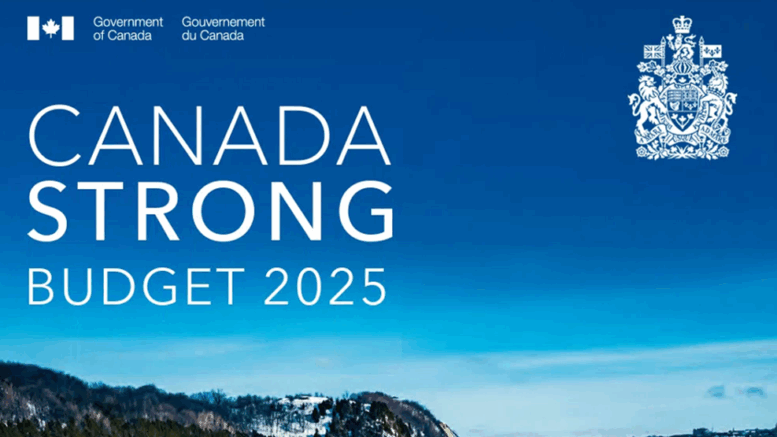by Jeremy Appel
(ANNews) – First Nations leaders across Canada say that the 2025 federal budget delivered last week by Finance Minister Francois-Philippe Champagne shortchanges Indigenous communities, providing nowhere near enough funding to fulfil Canada’s Treaty obligations.
The budget — entitled Build Canada Strong — outlines $141 billion in new federal spending planned for the next five years, including $56 billion in military spending, which will be funded with $58 billion in cuts.
A fact sheet from the Assembly of First Nations (AFN) notes that the budget has no specific chapter on Indigenous investments, which it had in previous years.
The budget “will continue the burdens of systemic harm and uncertainty for First Nations” by leaving “critical services for our Peoples without the sustained funding they require to be effective – and at serious risk of ending beyond 2026,” said the Confederacy of Treaty 6 First Nations in a Nov. 6 statement.
These shortcomings are “alarming and dangerous,” the confederacy added.
The Liberal government initially planned for 15 per cent cuts across the board except for the military, RCMP, intelligence, border enforcement and health transfer payments, but the Indigenous Services Canada and Crown-Indigenous Relations and Northern Canada budgets were each cut by two per cent, amounting to a combined $2.3 billion over five years.
The budget commits to $2.3 billion over three years to eliminate long-term drinking water advisories on reserves; doubling the Indigenous Loan Guarantee Program for equity in infrastructure projects to $10 billion; and tripling the Canada Infrastructure Bank’s investment target in Indigenous infrastructure to $3 billion.
The budget includes pre-existing funding of $2.8 billion for First Nations housing, $1 billion to implement Jordan’s Principle, which is intended to ensure First Nations children get equal access to services wherever they live, and $155 million for First Nations elementary and secondary schools.
The AFN, which made a pre-budget submission to the government, notes that the budget has “significant gaps in social areas, including no specific First Nations investment in health, training, language, or Truth and Reconciliation.”
“Budget 2025 falls short in meeting the urgent and long-term needs identified by First Nations. It lacks new investments in critical areas such as mental health and addictions treatment, policing, First Nations procurement, and education,” the AFN said.
The Chiefs Steering Committee on Technical Services, a group of chiefs representing Treaties 6, 7 and 8, called the funding in the budget “dramatically insufficient to address the urgent needs in critical infrastructure gaps across the Alberta region, particularly around clean water.”
Committee member Chief Troy Knowlton of Piikani Nation (Treaty 7) called Prime Minister Mark Carney’s inaugural budget “just fancy words on status quo.”
In a Nov. 5 statement from the Chiefs Steering Committee, he noted that the new funding for clean water and other infrastructure is only enough to continue projects that are already underway.
“It’s a single drop in the giant bucket that Canada created,” said Knowlton.
Chief Sheldon Sunshine of Sturgeon Lake Cree Nation (Treaty 8) said the “woefully inadequate” First Nations-specific funding in the budget does “nothing to meaningfully close the enormous gaps that exist.”
Kehewin Cree Nation (Treaty 6) Chief Vernon Watchmaker said First Nations Peoples are done “looking for more tokens; we are demanding justice and the financial tools necessary to govern our territories and ensure the well-being of our people.”
Grand Chief Kyra Wilson of the Assembly of Manitoba Chiefs acknowledges that the budget “contains good words and some important investments.”
“But good intentions are not the same as reconciliation,” said Wilson in a Nov. 5 statement. “Canada cannot call this a generational budget while reducing the very investments that ensure First Nations children have housing, clean water, and safety today.”
An alternative budget proposed by the Assembly of Manitoba Chiefs asks for $40.8 billion in funding for First Nations in Manitoba over the next year, including $13.1 billion for First Nations education and building schools on reserve, $11 billion for on-reserve housing, $4.2 billion for clean drinking water and wastewater treatment, and $3.5 billion for other community infrastructure.
“Some may interpret the required spending identified in this document as aspirational – but it demonstrates what Canada could and should do if it were genuinely committed to economic, social, health, and environmental Reconciliation that reflects the self-identified needs and priorities of the 63 First Nations of Manitoba,” the alternative budget notes.
Pimicikamak Cree Nation Chief David Monias added that historically, “Canada has underfunded the core services that keep our families safe — housing, water, health care, and education.”
“These are not program decisions. These are Treaty debts,” said Monias. “Every budget cycle that ignores Treaty is another year Canada benefits from our lands while denying our children the safety and dignity that were promised.”
Grand Chief Wilson said that loan guarantees are “tools our Nations can and will use.”
“But tools alone cannot close the gap — only fair, Treaty-based funding can,” she said.
Jeremy Appel is a Local Journalism Initiative Reporter.



Be the first to comment on "Treaty First Nations leaders reject Carney’s inaugural budget as inadequate"